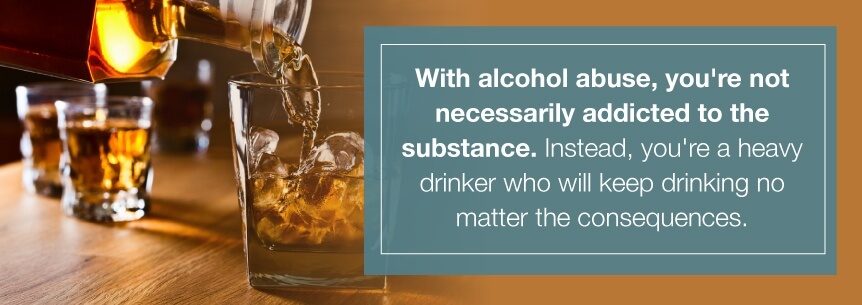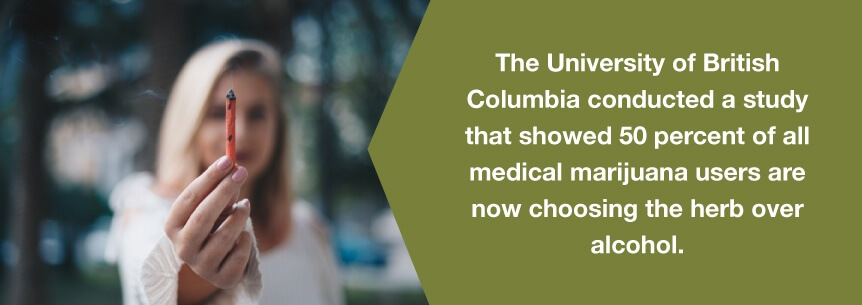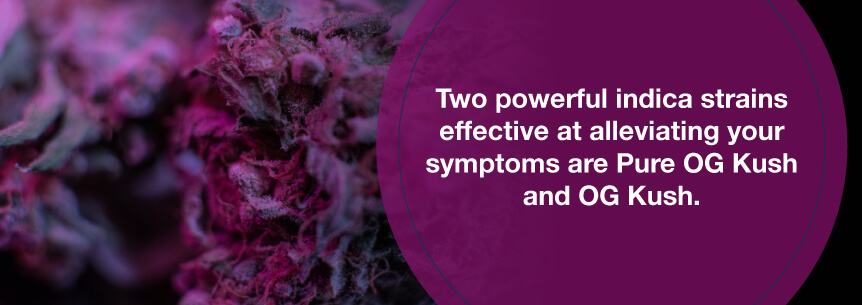From a celebratory toast of a victory to unwinding after a hard day’s work, alcohol has firmly fixed itself in American society. While alcohol abuse isn’t quite the same as alcoholism, it can lead to some of the same debilitating withdrawal symptoms. Researchers are finding medical marijuana treatment can help ease alcohol abuse symptoms and take the pain out of the withdrawal process.
Alcohol abuse can be just as troublesome as alcoholism and turn into a serious problem. It’s a pattern where you drink too much alcohol at any given time. It interferes with everyday life. You could be struggling with it regardless of whether you consume too much alcohol at one time or drink frequently throughout the week. Alcohol abuse is also harmful to personal relationships and impair your ability to function normally and at work and in professional settings and other areas of your life.
Alcohol abuse can lead to alcoholism, a physical dependency on alcohol. And, if you drink too much at once, it can result in alcohol poisoning.
Now, not all people who drink alcohol will necessarily become addicted. But some individuals seem to be more susceptible to addiction than others.
While they are closely related and symptoms can overlap, alcohol abuse and alcoholism aren’t the same. Alcoholism is where you’re physically and psychologically dependent on alcohol. You build up a tolerance to it and will even continue to drink despite alcohol-related problems.

For instance, some individuals may only drink once during the week, but when they do drink, they put themselves in risky situations, or they may drink enough to cause issues like alcohol poisoning. Some people who abuse alcohol eventually become alcoholics.
You’re abusing alcohol when:
Those suffering from alcohol abuse don’t always experience the same symptoms. The symptoms you experience will depend on certain factors, like your medical history or genetic makeup. Although symptoms of alcohol abuse do vary, certain behaviors and risk factors are indicative of a potential problem.
Research on alcohol abuse identifies five types of alcohol abuse. Evidence suggests younger adults make up half of Americans who abuse alcohol.
The five alcohol abuse types are:
Young adult subtype: These make up 32% of U.S. alcohol abusers. They’re young adults — around 20 to 24 years old — who don’t seek help for alcohol dependence. When they drink, they often binge drink.
Young antisocial subtype: These make up 21% of U.S. alcohol abusers. They’re, on average, 26 years old and typically start drinking at the age of 15. They’re also more likely to smoke weed and tobacco.
Functional subtype: Functional dependence accounts for up 19% of alcohol abusers. They’re typically middle-aged adults who work and have higher incomes, more education and stable relationships. They usually drink every other day and consume over five drinks when drinking.
Intermediate familial subtype: These make up 19% of alcohol abusers. Most have a family history of or genetic link to alcoholism. These individuals usually begin drinking around 17 years old.
Chronic severe subtype: These make up around 9 percent of alcohol abusers. This is a rare subtype that dominantly affects males. Illicit drug use and high divorce rates are also associated with chronic severe alcohol dependence.
Once alcohol enters the bloodstream, its effects can generally be felt within 10 minutes. The presence of alcohol in the body is determined by measuring concentration in the blood. This is known as BAC and many regulatory and legal authorities use different apparatuses and chemical tests to calculate the exact amount of alcohol present in the bloodstream at any given time. BAC levels increase with consumption. In other words, the more you drink, the higher or more elevated your BAC will be. Increasing the amount of alcohol in the body also increases the level of impairment on body and mental functions.
Physical effects of abusing alcohol may include:
Abnormal alcohol consumption habits and elevated consumption don’t just cause the above symptoms or varying degrees of intoxication. Some people become dizzy, blackout and lose consciousness, become delirious, or become extremely aggressive or confrontational towards themselves and others. Alcohol abuse can make individuals dangerous to their loved ones and themselves and lead to psychosis.
Alcohol abuse can lead to:
Prolonged alcohol misuse can lead to long-term side effects and health concerns.
The clinical diagnosis for alcohol abuse or misuse is alcohol use disorder or AUD. It is clinically classified as a chronic relapsing brain disease marked by things like:
It’s estimated that over 14 million individuals in the U.S. have AUD, according to the National Institute on Alcohol Abuse and Alcoholism (NIAAA).
According to the National Council on Alcoholism and Drug Dependence, Inc. (NCADD):
Alcohol abuse has been around as long as alcohol has existed — that is to say, thousands of years. China first produced fermented beverages back in 7000 B.C. The first historical mention of alcohol abuse appears in Ancient Greek literature. The U.S. tried to avoid these dangers by passing a law in 1920 prohibiting just about anything related to alcohol — except for medical reasons. During Prohibition, doctors wrote whiskey prescriptions for patients who weren’t using it as directed. People consumed many gallons of alcohol during that time via prescriptions alone. Alcohol prohibition was repealed with the passing of the 21st Amendment to the United States Constitution in 1933.
To this day, alcohol and the risk of abuse continue to be serious threats to our society.
If you have a genetic predisposition to or a family history of alcohol abuse, you’ll likely have to work more than others at resisting the urge to use alcohol. Ways you can reduce your consumption of alcohol include:
Moderation: Limit yourself to only one drink, unless your doctor tells you to avoid alcohol entirely.
Get Help: Obtain treatment for any underlying mental health disorder. Consult with your doctor to get screened for alcohol abuse disorder.
Watch the Company You Keep: Avoid people who abuse alcohol and settings where alcohol is present.
Join a Support Group: Go to a support group where others face the same challenges with alcohol.
If you’re struggling with alcohol abuse, the first step is to recognize you need help. Research shows those who abuse alcohol benefit from treatment. Though there are various treatments for AUD, each person is different. Some treatment options are more effective than others. Treatment considerations and success is highly dependent on the person and their support system. The sooner you receive treatment, the better.
Standard alcohol abuse treatments include:
Health professionals use behavioral therapy for treating alcohol abuse. This can be through counseling, support groups or both. Usually, there are no side effects to therapy, other than having to spend the time in sessions.

Your doctor may prescribe medication to help you reduce or stop your drinking. Some examples of medication are:
Naltrexone
Naltrexone blocks the good feelings associated with alcohol consumption, reduces urges and prevents excess consumption. Treatment adherence is critical. Noncompliance or overdosing on naltrexone can lead to liver damage. Inform your doctor if you experience any of these symptoms while taking this medication:
Acamprosate
Acamprosate helps keep your cravings for alcohol to a minimum after you’ve stopped drinking. Some side effects of this medication include:
Disulfiram
Disulfiram is effective at keeping you from drinking. However, it doesn’t take away the compulsion to drink or cure alcohol use disorder. If you consume alcohol while taking this medication, it can cause any of the following physical reactions:
The difference between disulfiram and the other two medications above is it makes you physically sick if you drink while you’re on it.
Vivitrol
Vivitrol is a form of naltrexone. It is administered as a monthly injection. This medication is also available in pill form, the injectable form is much easier and convenient for those struggling with alcohol abuse.
Inpatient treatment at an alcohol rehab center is designed to help you when you abuse alcohol or have become addicted. You stay at the center for a specific period. Many treatment facilities offer both short- and long-term programs.
You’ll start off with a period of detoxification during treatment. Detoxification is when all traces of alcohol metabolize from the body so you can adapt and overcome your physical dependency to it.
When you’re struggling with alcohol abuse, to complete the treatment program successfully, you must have a full understanding of your problem with alcohol to leave the center. You’ll receive support through both individual and group therapy.
While in therapy sessions, you’ll explore the reasons behind your alcohol abuse and learn coping skills and strategies to help you overcome this abusive behavior. Therapists and counselors at the treatment center are trained to provide you with healthier alternatives to drinking so you can move on to a more productive lifestyle.
With outpatient treatment, you’ll also explore your destructive behavior in a safe environment. You often attend anonymous group meetings and other programs to help you overcome your problems. Outpatient centers are not controlled environments, so you still are exposed to outside temptations during your treatment. Because of this, outpatient treatment programs best suit those who have successfully completed an inpatient treatment program.
Currently, the medical community recognizes that medications don’t address alcohol abuse as effectively as needed. More clinical trials and research are necessary for the development of treatments with higher efficacy. Fatemeh Akhlaghi, the Ernest Mario Distinguished Chair in Pharmaceutics, is leading a team in testing medicine to treat alcohol abuse and alcohol use disorder. This new trial is the first of many.
In Vancouver, the University of British Columbia conducted a study that showed 50 percent of all medical marijuana users prefer cannabis over alcohol. This suggests that weed is a substance that reduces the urge or need to drink or consume alcohol. Though some individuals use both alcohol and cannabis recreationally, many others strictly use cannabis instead of alcohol.

Cannabis Can Lessen the Severity of Alcohol Withdrawal Symptoms
The underlying issue with alcohol withdrawal is prolonged drinking changes the brain chemistry. In fact, NIAAA states alcohol intoxication changes the delicate balance of various neurotransmitter chemicals, leading to things like:
When you’re drinking continuously for many days or weeks, your brain begins adjusting to the constant state of intoxication. Being sober eventually causes an imbalance in brain chemicals, leading to withdrawal symptoms.
A recent study published by the National Library of Medicine shows that cannabinoid receptors mediate these brain chemical changes after drinking alcohol long-term. As you may know, the marijuana plant contains powerful cannabinoids, providing diverse medicinal effects. Because of this, medical marijuana could become a direct treatment for alcohol abuse to help with withdrawal symptoms.
When going through mild withdrawal from alcohol, you may experience symptoms such as:
When withdrawal symptoms are severe, delirium tremens and seizures are likely to occur.
Alcohol detox symptoms can impair your everyday function, affecting your work, home, and social life.
There’s no shortage of scientific or medical evidence that cannabis is an effective medicinal treatment for delirium tremens and other alcohol related issues. Symptoms of delirium tremens medical weed can help with include:
You’ll find several marijuana strains that are effective at alleviating your symptoms. Two powerful indica strains are Pure OG Kush and OG Kush. But, there are other strains potentially helpful for combating alcohol abuse-related symptoms, including:
Strains for Nausea
Strains for Anxiety
Strains for Cravings
Strains for Depression
Strains for Insomnia

Your cannabis doctor or budtender can help you find the right strains to ease your symptoms.
Cannabis flowers, concentrates, and extracts might be a good starting point for introducing medical cannabis and cannabinoids into your bloodstream. However, if you are concerned about smoking risks, you may benefit from topicals, salves, and creams. Topical cannabis products don’t expose you to the harmful toxins and compounds associated with smoking. Vaporizing and medicated edibles are also safer consumption methods. Another option is cannabis infused teas and beverages.
Individuals say a good dose is one or two hits of cannabis in the morning and then again in the evening. Some people may need to dose more frequently, like every few hours.
Other safe, yet popular marijuana products for alcohol abuse include:
When looking for a cannabis doctor to help you get started with your marijuana treatment for alcohol abuse, look no further than MarijuanaDoctors.com. Here you can feel secure and confident about talking about your alcohol abuse problem with a qualified professional.
They’ll give you advice and your recommendation for medical cannabis for alcohol abuse. Then, you can search our directory for a medical marijuana dispensary to shop for your cannabis products.
Find A Doctor Find A Dispensary